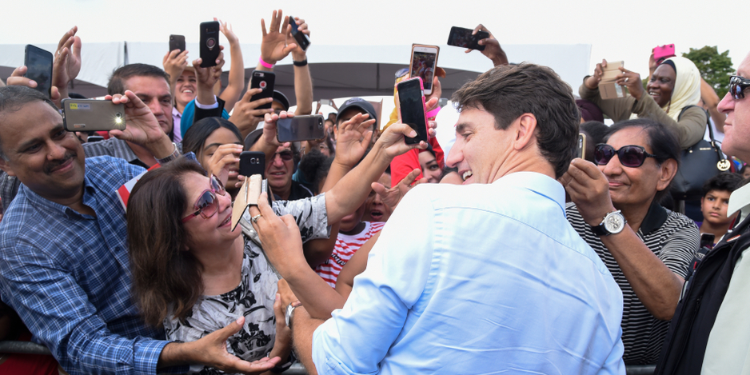
Canada, one of the most popular expat destinations, is set to elect their Prime Minister on the 21st of October. Expat.com chats to a short-term expat living in Canada at the moment as well as a long-term expat who has chosen to run in the elections.
An overview of Canada's elections
This coming Monday, Canadians are going to the polls to vote on the 43rd Canadian general election. The current Prime Minister, Justin Trudeau, who is globally known for his quirky socks and liking for selfies as much as he is for his progressive policies, climate change fighting, and welcoming of refugees, isn't sure that Canadians will give his party a second term in office. Mr. Trudeau and the conservative leader, Andrew Scheer, are running neck-and-neck, followed by Jagmeet Singh from the New Democratic Party, with polls suggesting he has won 20% of the voters.
The environment, financial stability, and economic issues are the top concerns among Canadians in this election. Even though unemployment is at historic lows and in 2017, 278,000 children from poverty benefited from Trudeau's child allowance programme; voters cannot turn a blind eye to the sky-high housing prices and the federal carbon tax due to which petrol and fuel costs are swelling. Mr. Scheer has committed in his campaign to repeal the carbon tax — which was Liberals' attempt to meet the Paris Agreement commitments — as soon as he gets into business.
An expat's insight into the 2019 elections
Hannah from the UK arrived in Vancouver, BC, ten months ago on a Working Holiday Visa. Even though she is trying, she hasn't been following Canadian politics as closely as she intended to, or she would normally follow an election at home. “I think that is because it's a full- time job following UK politics at the moment, and I'm politics-ed out. Also, I have to be active in keeping up with the news as I don't have a TV to switch on Canadian news casually, and most of my social media is UK-focussed,” she explains. “However, I read articles about the Canadian election on UK media, as I find these don't assume any previous knowledge about Canadian politics, so are easier to follow,” she adds.
“What surprised Hannah the most in Canada's politics?” we ask. “When I first moved here, I was surprised about the negative feeling I heard towards Trudeau compared to his largely positive international reputation. Through my colleagues and my Canadian network, I have been slowly learning about regional voting differences.”
When we ask Hannah why she thinks it is important even for short-term residents and expats to participate in the public life of their host country, she answers: “Visitors and international spectators need to pay attention and participate because we live in a global world where one country's opinions and leadership can have big effects on the world. Look at Trump, for example, pulling the US out of the Paris Climate Change agreement. I think you need to get involved to understand why people vote, how they vote, and to see what's important to different populations. Being here and speaking to people, I hear arguments on both sides about hugely controversial topics such as the pipeline expansion project. I have also learned about issues that I previously knew nothing about, such as the Missing and Murdered Indigenous Women and Girls. If I can learn about issues like this and give them a voice, then that's great too.”
Ghada Alatrash, candidate in the elections

Here is what Ghada Alatrash, the Liberal candidate for Calgary Signal Hill in Alberta, a teacher at Mount Royal University, and immigrant from Syria told us about her political participation and life in Canada as an immigrant.
What was your drive behind entering public life?
I am a citizen of our humanity, and I take it as a cause and as a responsibility to contribute to making a difference and work towards the ultimate goal of social justice. For me, it is not a choice; it is my responsibility.
What are some of your strongest memories from your early days as a newly arrived immigrant in Canada?
The magnificent white snow-capped mountains in August that continue to humble me on a daily basis, the breathtaking lakes that quench the soul in this dry humanity, and the kindness and warmth of the hearts of the Canadian people.
Among others, you are devoted to issues of diversity and inclusion in our society. How, in your opinion, we can eliminate barriers of geography?
I think that all walls would be dismantled if we could find a way to hear people's stories in their own voices. I deeply believe that we can only disrupt the dominant and divisive narratives by offering the space for people to tell their stories and to speak about their human conditions. I see this happen all the time in my classes — an empathetic cultural understanding seems to always surface and find its way into the hearts and minds of people when they connect on that human level and away from political and misrepresentative narratives. Stories have the power to transform us in a deeply human way.
What is the greatest asset you have acquired due to your life in a foreign country?
I have come to see other ways of knowing. My knowledge is shifted daily and continues to allow for new possibilities of knowing to emerge.
How much of an impact has the Syrian culture had on the upbringing of your children?
My children are that “hybrid product” and “third space'' as in the words of theorist Homi Bhabha. They are not one culture or the other, but a rich mix of layers that adds to their identity and their ways of knowing.
How important is it for expats to be involved in the politics of their host country?
I think it is our responsibility as humans in our humanity to always be engaged in the making of social justice. Being bystanders in any country, home or host is not an option — not for me and not for my children.



















